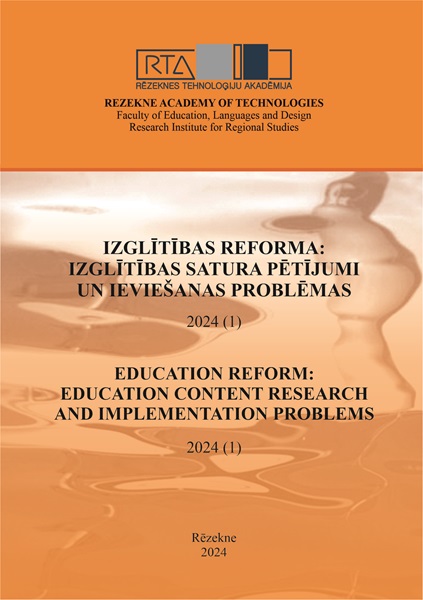POSSIBILITIES FOR ALLEVIATING UNWANTED BEHAVIOR PROBLEMS FOR 4TH-6TH GRADE STUDENTS
DOI:
https://doi.org/10.17770/er2024.1.7783Keywords:
early identification, methodology, risk factors, social-emotional learning, student behavior disordersAbstract
The aim of this scientific article is to present the development of a comprehensive methodology for the prevention of student behavior disorders, focusing on the reasons that contribute to their occurrence. The development of this methodology is based on research that analyzes the risk factors associated with behavioral disorders in students, studying the interaction between individual, family and environmental factors.
The article will discuss about methodological components, including early identification and intervention, social-emotional learning programs, positive behavior support systems, and collaboration between educators, parents, and mental health professionals. The findings will include recommendations for improving programs designed to prevent unwanted behavior.
References
Arumugam, S., Kway, E. H., & Isa, Z. M. (2019). Developing symptomatic behavior screening tool (symbest) for children with behavior problems: A fuzzy Delphi method. Muallim Journal of Social Sciences and Humanities, 141-171. DOI: https://doi.org/ 10.33306/mjssh12
Beizītere, I., Grumolte-Lerhe, I., Ziemane, I., & Valtenbergs, V.(2020). Iekļaujošā izglītība bērniem ar speciālām vajadzībām Latvijā. Pieejams: https://www.saeima.lv/petijumi/ Ieklaujosa_izglitiba_berniem_spec_vajadzibam_Latvija.pdf
Bezborodovs, Ņ.(2021). Emocionālās un uzvedības grūtības pirmsskolas vecuma bērniem. Bērnu klīniskās universitātes slimnīca. Pieejams: https://www.izm.gov.lv/lv/ media/11657/download
Brush, K. E., Jones, S. M., Bailey, R., Nelson, B., Raisch, N., & Meland, E. (2022). Social and emotional learning: From conceptualization to practical application in a global context. Life skills education for youth: Critical perspectives, 43-71. DOI: https://doi.org/10.1007/978-3-030-85214-6
Daunic, A. P., Smith, S. W., Aydin, B., & Barber, B. (2019). Lowering risk for significant behavior problems through cognitive-behavioral intervention: Effects of the Tools for getting along curriculum 2 Years following implementation. The Journal of Primary Prevention, 40, 463-482. DOI: doi.org/10.1007/s10935-019-00554-3
Davodi-Boroujerd, G., Abasi, I., Arani, A. M., & Aslzaker, M. (2022). The Relation between Maternal Personality and Internalizing/Externalizing Behaviors: Mediating Role of Maternal Alexithymia, Children’s Alexithymia and Emotional Regulation. Iranian journal of psychiatry, 17(1), 61. DOI: 10.18502/ijps.v17i1.8050
Elrod, B. G., Rice, K. G., & Meyers, J. (2022). PBIS fidelity, school climate, and student discipline: A longitudinal study of secondary schools. Psychology in the Schools, 59(2), 376-397. DOI: 10.1002/pits.22614
Evans, V. (2016). An evaluation of CHAMPS for classroom management (Doctoral dissertation, Walden University). DOI: https://scholarworks.waldenu.edu/dissertations
Herman, K. C., Reinke, W. M., Dong, N., & Bradshaw, C. P. (2022). Can effective classroom behavior management increase student achievement in middle school? Findings from a group randomized trial. Journal of Educational Psychology, 114(1), 144. DOI: https://doi.org/10.1037/edu0000641
Hsu, Y. C., Chen, C. T., Yang, H. J., & Chou, P. (2022). Family, personal, parental correlates and behavior disturbances in school-aged boys with attention-deficit/hyperactivity disorder (ADHD): a cross-sectional study. Child and adolescent psychiatry and mental health, 16(1), 1-11. DOI: https://doi.org/10.1186/s13034-022-00467-w
Huitsing, G., Lodder, G. M., Browne, W. J., Oldenburg, B., Van der Ploeg, R., & Veenstra, R. (2020). A large-scale replication of the effectiveness of the KiVa antibullying program: A randomized controlled trial in the Netherlands. Prevention science, 21, 627-638. DOI
https://doi.org/10.1007/s11121-020-01116-4
Humaeroah, H., Sardi, A., & Ermawati, E. (2023). Teacher Perspective: Managing Students’ Behavior Problem in Teaching English at Primary School. IDEAS: Journal on English Language Teaching and Learning, Linguistics and Literature, 10(2), 2113-2121. DOI: 10.24256/ideas.v10i2.3206
Jennings, P. A., & Greenberg, M. T. (2009). The prosocial classroom: Teacher social and emotional competence in relation to student and classroom outcomes. Review of educational research, 79(1), 491-525. DOI: https://doi.org/10.3102/0034654308325693
Lapsiņa, I., Miesniece, A. A., & Bite, I. (2022). Childrens’ behaviour problems’ and parents’ parenting behaviour changes after participation in a modified multimodal early intervention program “STOP 4–7”. Baltic Journal of Psychology, 23(1/2), 84-105. DOI: https://doi.org/10.22364/bjp.23.05
Lapsiņš, O.(red.) (2020). Garīgās veselības veicināšana izglītības iestādēs. Vadlīnijas politikas veidotājiem. Pieejams: https://dspace.lu.lv/dspace/bitstream/handle/7/61196/Promehs_ Politikas_veidotaju_rokasgramata.pdf?sequence=1
Lawrence, T., Holubz, B. J., Hixon, M., & Paynter, K. (2022). Implementing PBIS with Fidelity: Secondary School Staff Members’ Descriptions of School Climate. Journal of Educational Research and Practice, 12(1), 21. DOI: https://doi.org/10.5590/ JERAP.2022.12.1.19
LR Saeima. (1998). Izglītības likums. Pieejams: https://likumi.lv/doc.php?id=50759
LR Saeima. (2023). Ministru kabineta noteikumi Nr. 474. Kārtība, kādā nodrošināma izglītojamo profilaktiskā veselības aprūpe, pirmā palīdzība un drošība izglītības iestādēs un to organizētajos pasākumos. Pieejams: https://likumi.lv/ta/id/344779-kartiba-kada-nodrosinama-izglitojamo-profilaktiska-veselibas-aprupe-pirma-palidziba-un-drosiba-izglitibas-iestades
LR Saeima. (2004). Administratīvā procesa likums. Pieejams: https://likumi.lv/ta/id/55567-administrativa-procesa-likums
LR Saeima. (2020). Noteikumi par valsts pamatizglītības standartu un pamatizglītības programmu paraugiem. Pieejams: https://likumi.lv/ta/id/303768-noteikumi-par-valsts-pamatizglitibas-standartu-un-pamatizglitibas-programmu-paraugiem
Ministru Kabinets. (2023). Programma "STOP 4-7". Pieejams: https://www.mk.gov.lv/lv/ programma-stop-4-7
Nīmante, D. (2016). Ieskats APU ( Atbalsts pozitīvai uzvedībai) – sistēmiska prevencijas un intervences programma vardarbības mazināšanai. Pieejams: https://www.lps.lv/uploads/ docs_module/3_Ieskats%20APU.pdf
Pārresoru koordinācijas centrs. (2021) Konceptuālais ziņojums “Starpnozaru sadarbības un atbalsta sistēmas pilnveide bērnu attīstības, uzvedības un psihisko traucējumu veidošanās risku mazināšanai”. Pieejams: https://tap.mk.gov.lv/doc/2019_09/ PKC_KoncZin_Bernu_psihiska_ve.1584.docx
Pārresoru koordinācijas centrs. (2020) Programma "STOP 4-7". Pieejams: https://www.pkc.gov.lv/lv/sabiedribas-lidzdaliba/iniciativas-un-darba-grupas/program ma-stop-4-7
Petrasek, M., James, A., Noltemeyer, A., Green, J., & Palmer, K. (2022). Enhancing motivation and engagement within a PBIS framework. Improving schools, 25(1), 37-51.
Peršēvica, A. (2020). Ar “Mācīties būt“ labjutība ienāk skolā. Pieejams: https://skola2030.lv/ lv/jaunumi/blogs/visc-istenotais-erasmus-projekts-macities-but
Pirsko, L. (2010). Piesaistes stila saistība ar uzvedības traucējumiem un bērnu un vecāku vardarbības pieredzi. Pieejams: https://dspace.lu.lv/dspace/handle/7/4894
PISA. (2018). What School Life Means for Students’ Lives. PISA 2018 Results (Volume III). DOI: https://doi.org/10.1787/19963777
Pudule, I., Velika, B., Grīnberga, D., Gobiņa, I., Villeruša, A., Kļaviņa-Makrecka, S., & Bezborodovs, Ņ. (2020). Latvijas skolēnu veselības paradumu pētījums Slimību profilakses un kontroles centrs. Pieejams: https://www.spkc.gov.lv/sites/spkc/files/data_ content/latvijas-skolenu-veselibas-paradumu-petijums-05.10.2020_1.pdf
Scattolin, M. A. D. A., Resegue, R. M., & Rosário, M. C. D. (2022). The impact of the environment on neurodevelopmental disorders in early childhood. Jornal de Pediatria, 98, 66-72. DOI: https://doi.org/10.1016/j.jped.2021.11.002
Spriņģe, L., Gobiņa, I., Ķīvīte-Urtāne, A., & Maļina, L. (2023). Profilakses un agrīnās intervences programmas KiVa monitoringa pētījums par pāridarījumu izplatību skolēnu vidū. Pieejams: https://www.mk.gov.lv/lv/media/17100/download?attachment
Svence, G. (2020) Psiholoģija jaunajam skolotājam. Pieejams: https://dspace.lu.lv/dspace/ bitstream/handle/7/56412/svence_guna-psihologija_jaunajam_skolotajam-book.pdf
Valsts Republikas Valsts kontrole (2022). Problēmbērni – pieaugušo neizdarības spogulis. Pieejams: https://lrvk.gov.lv/lv/getrevisionfile/29565-ikOI7xAmr_o-vESqJnas3Xw0cG Vm5oS2.pdf






